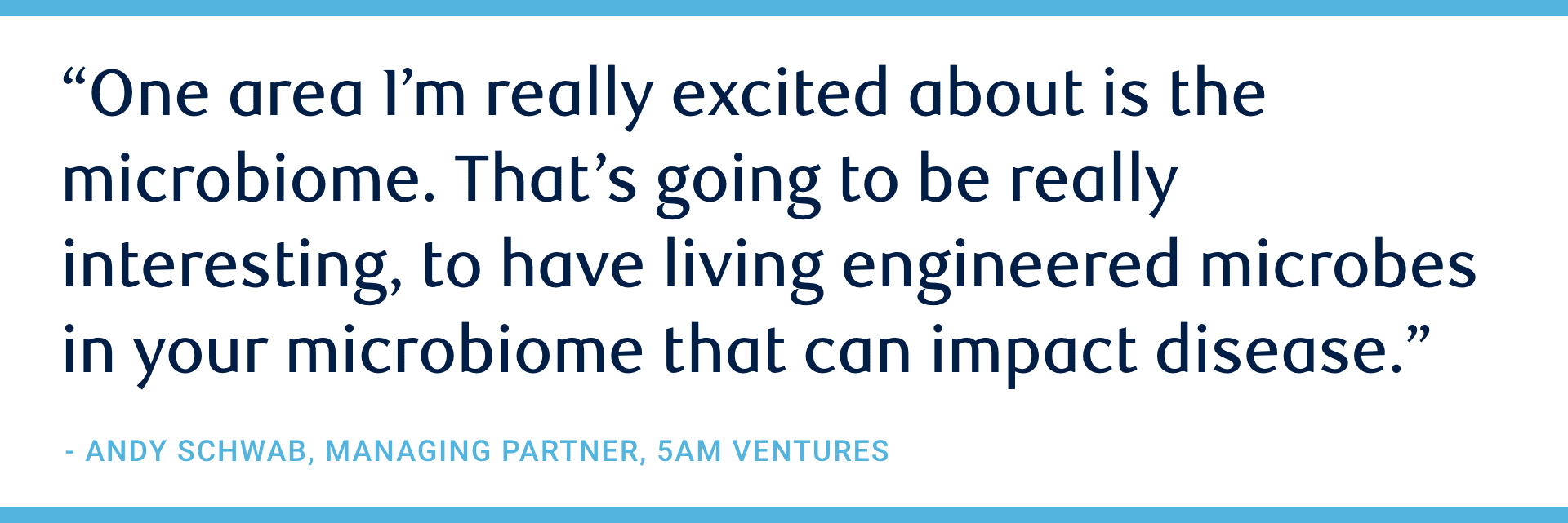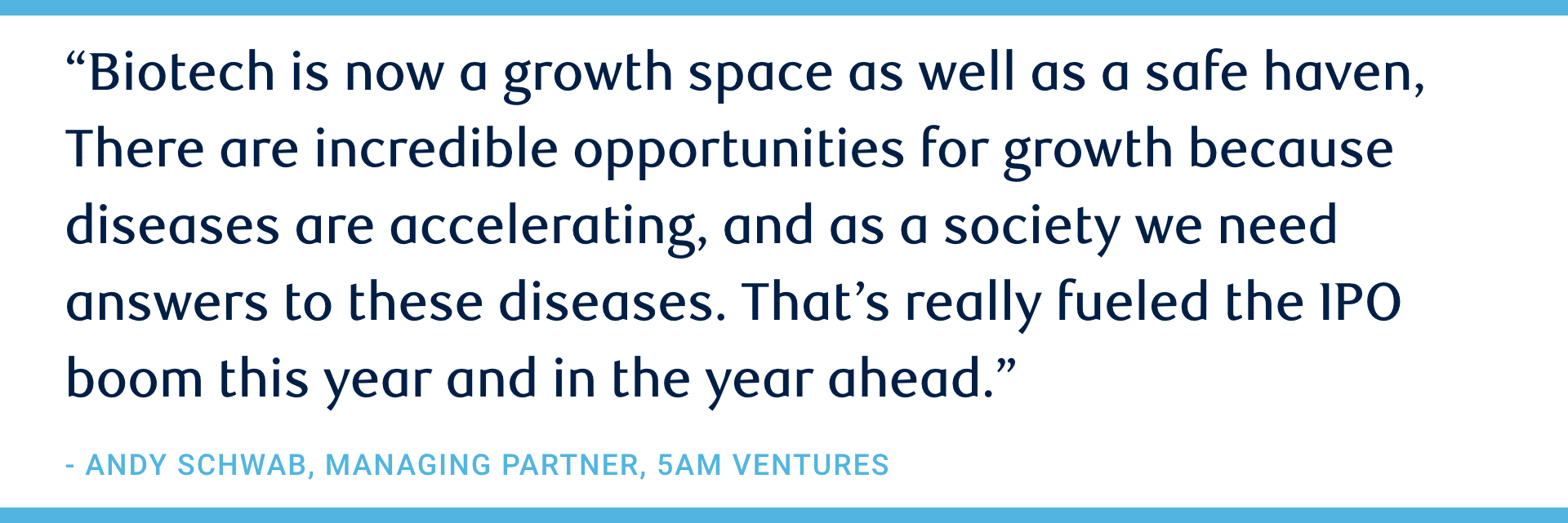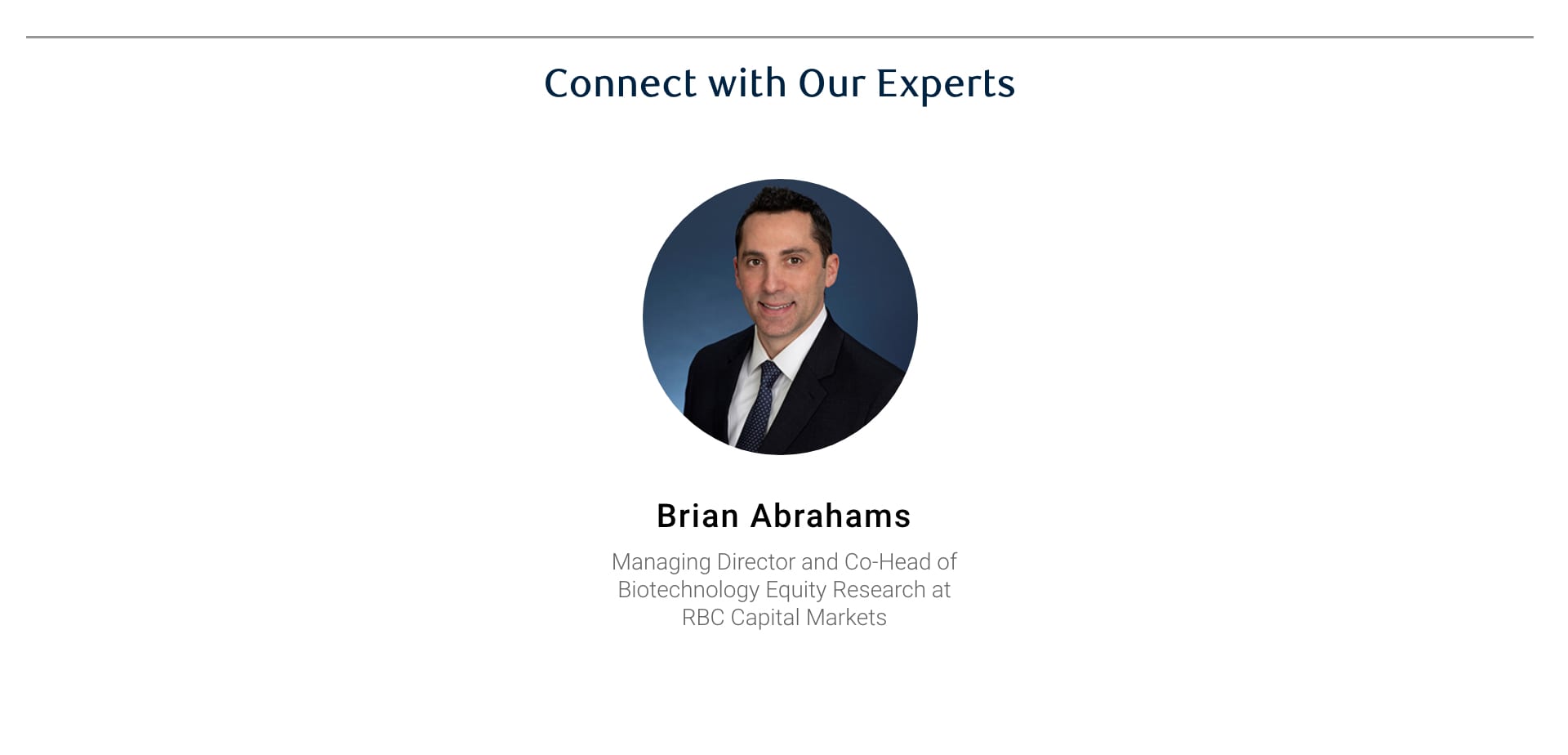
5AM Ventures: Fueling the Next Generation of Innovators
By RBC Capital Markets
With Andy Schwab, Co-Founder and Managing Partner at 5AM Ventures
Key Points
- Prescription Digital Therapeutics, cell therapy technologies, and in silico medicines will be a vital part of future treatment modalities.
- Unlocking the potential of the microbiome could be the missing link to better disease diagnosis.
- Growing links between academia, industry, and venture capital are spinning out more innovative biotech companies.
- Biotech is now seen by investors as a growth space as well as a safe haven, fuelling the recent IPO boom.
Brian Abrahams, Managing Director and Co-Head of Biotechnology Equity Research at RBC Capital Markets, speaks with Andy Schwab, Co-Founder and Managing Partner at 5AM Ventures, one of the world’s leading VC firms focused on creating value in early-stage life science companies.
In this exclusive interview, Andy shares some of the unique characteristics of 5AM’s investment approach, how he identifies high potential scientific innovation at the earliest possible stage, and his perspectives on the IPO boom in biotech.
Listen to the full interview on Pathfinders, a new podcast from RBC for companies and investors in biopharma. Start listening now.
Brian Abrahams
What are some of the cutting-edge technologies across your portfolio companies that you think are the most exciting?
Andy Schwab
I think everything that’s being developed in cell therapy and the CAR T space right now is incredibly interesting. Obviously, there are read-throughs into lots of other cell therapy technologies, and into diseases outside of oncology. The in silico space, on the technical side of identifying new targets, is also another area that we’re excited by.
And one area I’m really excited about is the microbiome. That’s going to be really interesting, to have living engineered microbes in your microbiome that can impact disease. If we can engineer microbes to live – safely, obviously – in your microbiome over time and treat disease, there’s a huge opportunity there.
BA
What therapeutic areas do you view as most ripe for investment with the most potential for innovation? And, conversely, are there any disease areas that you see as particularly challenging?
AS
We think any disease that has a genetic basis that you can attack and target are the best diseases to go after. The low hanging fruit there has been in oncology, in precision medicine, in gene therapy and gene editing.
Some of the more chronic, lifestyle-driven diseases are just harder to pursue. They’re so multi-factorial. It’s much more challenging to choose points for meaningful intervention and innovation in those areas.
What are the future treatment modalities and scientific breakthroughs that will enable better disease management and get investors excited? Find out on RBC’s Pathfinders in Biopharma podcast series. Start listening now.
BA
How much does the FDA influence your strategy of cutting-edge investment? To what degree does the regulatory landscape dictate the opportunities that are pursued by companies, and how you value them?
AS
I think the FDA is incredibly important. Over the past decade, I’ve been very impressed by how much more entrepreneurial, thoughtful, and science-driven they’ve become, particularly with the response to COVID-19 under extremely tough circumstances.
I can remember, earlier in my career, going outside the U.S. to develop therapeutics, because it was easier to get into clinical trials in other countries. Any swing back in a negative direction would have a huge impact on investment.
BA
What’s your perspective on the relationship between venture firms and universities? How has that evolved?
AS
We’ve seen more and more interest from universities in spinning up companies and being entrepreneurial with the financial community. Scientists have also become more entrepreneurial. You can name a number who are involved with dozens of companies at this point.
But it’s not as easy as just taking your best researchers or your best research and starting companies. It takes experience. It takes capital and it takes manpower.
BA
What do you see as an early marker of a great idea? How can you tell when a concept can lead to a successfully marketed product?
AS
We see incredible science from the best scientists in the world on a daily basis and we get excited by all of it. But, ultimately, this is an investment business, and our job is to bet on the ideas that are going to get to market and help patients.
Several things help us to do that. One is having very deep and broad investment teams, both in San Francisco and Boston, who are ex-pharma executives that have been there, done that, and seen all the pitfalls in terms of which drugs ultimately get to market.
From a primary diligence perspective, we aim to do the hard work at the outset to define early on exactly what it is that’s going to prove this science is going to be meaningful. We can put $5 to $10 million to work to find that out.
Sometimes it leads to failure and we write off the investment and move on. But by asking the hardest questions early on, when it does lead to success, we’ve got a lot of confidence in its ability to get all the way to the market.
BA
It’s been a record-breaking year for biotech IPOs. How do you see the public markets receptivity to innovation today?
AS
Two key points on that. The first is that companies are going public much earlier. Half of the IPOs this year are either preclinical or early clinical, and I think that’s a nod to the fact that we are now able to see much earlier in clinical trials whether a product is going to be successful or not. That bodes very well for the future, and it’s why the public investors are excited about investing in companies at earlier stages.
The second point is that biotech is now a growth space as well as a safe haven. There are incredible opportunities for growth, because diseases that are accelerating, and as a society we need answers to these diseases. That’s really fueled the IPO boom this year and the year ahead.
Gain perspective to help you lead today and define tomorrow with Pathfinders, a new podcast from RBC for companies and investors in biopharma. Learn more.


